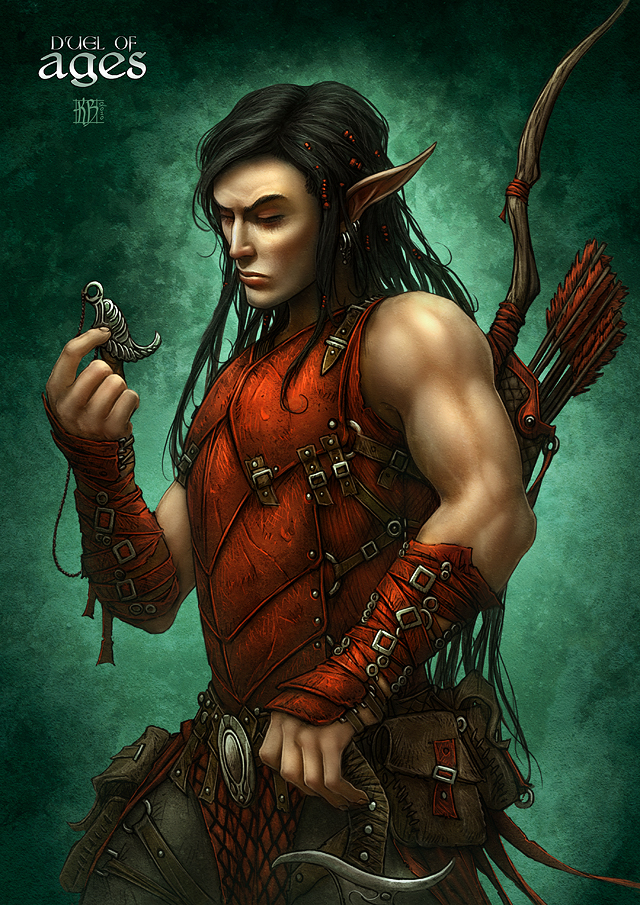ARAVILAR DUNDRAGON
Male half-elf, Half-Elf Paragon 1/Ranger 6
NG Medium humanoid (half-elf)
Init +3
DEFENSE
AC 18, 13 touch, 15 flat-footed (+4 Studded, +1 Bracers)
HP 63/63 (1d8+1 plus 6d10+6)
SV Fort +7 (5), Ref +11 (7), Will +5 (2) (+1 Cloak)
OFFENSE
Spd 30 ft. (9m)
Melee: +1 keen scimitar +9/+4 (1d6+3, 15+)
Ranged: +1 composite longbow +10/+5 (1d8+2, x3, 33m)
Ranged: +1 composite longbow +11/+6 (1d8+2§ plus sleep, 33m)
Ranged: +1 composite longbow +12/+7 (1d8+2 plus screaming, x3, 33m)
STATISTICS
Str 14, Dex 16, Con 12, Int 10, Wis 14, Cha 10
Base Attack: +6/+1, grapple +8
Skills: Balance +7 (2+2), Bluff +0 (+4 vs Monstrous Humanoids, +2 vs Constructs), Climb +8 (2+2+2), Craft (bowmaking) +2 (2), Handle Animal +6 (6), Heal +6 (4), Hide +7 (+9 in forest) (4), Intimidate +4 (4), Jump +4 (2), Knowledge (dungeoneering) +2 (2), Knowledge (geography) +2 (+4 in forest) (2), Knowledge (nature) +4 (4), Listen +6 (+8 in forest) (+10 vs Monstrous Humanoids, +8 vs Constructs) (2+2), Move Silently +7 (+9 in forest) (4), Search +7 (2+2[+3]), Sense Motive +2 (+6 vs Monstrous Humanoids, +4 vs Constructs), Spot +8 (+10 in forest) (+12 vs Monstrous Humanoids, +10 vs Constructs) (4+2), Survival +6 (+8 in forest) (+10 vs Monstrous Humanoids, +8 vs Constructs) (4), Swim +6 (2+2)
Feats: Athletic, Deadly Aim, Endurance, Improved Unarmed Strike, Point Blank Shot, Precise Shot, Rapid Shot, Skill Focus (search), Treetopper
Talents (Half-Elf Paragon): Bonus Feat, Divided Ancestry, Elven Senses
Talents (Ranger): 1st Favored Enemy (Monstrous Humanoid), 2nd Favored Enemy (Construct), Track, Wild Empathy, 1st Combat Style Feat, Endurance, Favored Terrain (forest), Hunter’s Bond (animal companion), Divine Spells (1+1), 2nd Combat Syle Feat
Racial Traits (Half-Elf): Low-Light Vision, Adaptability, Elf Blood, Elven Immunities, Keen Senses, +2 to one ability score
Combat Gear: Bracers of armor (+1), cloak of resistance (+1), +1 composite longbow (Str +2), +1 keen scimitar, +2 screaming arrow (1), +1 sleep arrow (4), +1 studded leather
Other Gear: Bag of tricks, elixir of hiding, potion of cure light wounds (7), potion of cure moderate wounds (1)
DETAILS
Languages: Elven, Human (chondathan)
Region: High Forest
Patron Deity: Solonor Thelandira
Player: DIOGO (aka Gomendrown)
